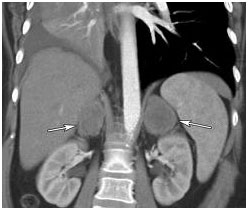Overview
One of the most common tumors is a pheochromocytoma, which can cause very high blood pressure. Other disorders include Cushing syndrome, Conn syndrome, and an adrenal mass of unknown cause
Adrenalectomy can be performed in two ways.
- In the “open” surgery, the surgeon makes one large surgical cut to remove the gland.
- With the robotic technique, several small cuts are made
These minimally invasive robotic techniques have translated into a significant benefit to patients including
- Reduced blood loss and transfusions,
- reduced pain,
- shorter hospital stays,
- improved cosmesis
- shorter hospital stays,
- and a faster recovery as compared to open surgery
While open surgery requires either a large abdominal or flank incision, minimally invasive approaches involve 3-4 keyhole incisions in the abdomen. Most patients with adrenal tumors who are candidates for open surgery are also excellent candidates for a robotic approach. These minimally invasive approaches have become the standard of care for most adrenal tumors.
Patients with very large tumors or tumors invading surrounding structures e.g. vena cava, kidney, liver, bowel may be best served by an open approach due to the extent and need for adjacent organ resection

CT Scan showing bilateral adrenal tumor
Medical conditions such as severe lung and heart disease may not be able to tolerate a robotic approach.

